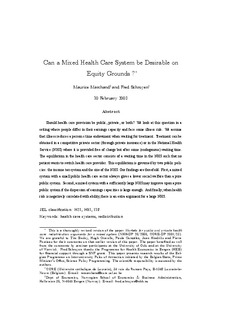| dc.contributor.author | Marchand, Maurice | |
| dc.contributor.author | Schroyen, Fred | |
| dc.date.accessioned | 2006-08-08T07:37:39Z | |
| dc.date.available | 2006-08-08T07:37:39Z | |
| dc.date.issued | 2003-02 | |
| dc.identifier.issn | 0804-6824 | |
| dc.identifier.uri | http://hdl.handle.net/11250/162790 | |
| dc.description.abstract | Should health care provision be public, private, or both? We look at this question in a
setting where people differ in their earnings capacity and face some illness risk. We assume
that illness reduces a person's time endowment when waiting for treatment. Treatment can be
obtained in a competitive private sector (through private insurance) or in the National Health
Service (NHS) where it is provided free of charge but after some (endogenous) waiting time.
The equilibrium in the health care sector consists of a waiting time in the NHS such that no
patient wants to switch health care provider. This equilibrium is governed by two public policies:
the income tax system and the size of the NHS. Our findings are threefold. First, a mixed
system with a small public health care sector always gives a lower social welfare than a pure
public system. Second, a mixed system with a sufficiently large NHS may improve upon a pure
public system if the dispersion of earnings capacities is large enough. And finally, when health risk is negatively correlated with ability, there is an extra argument for a large NHS. | en |
| dc.format.extent | 323846 bytes | |
| dc.format.mimetype | application/pdf | |
| dc.language.iso | eng | en |
| dc.publisher | Norwegian School of Economics and Business Administration. Department of Economics | en |
| dc.relation.ispartofseries | Discussion paper | en |
| dc.relation.ispartofseries | 2003:4 | en |
| dc.subject | health care systems | en |
| dc.subject | redistribution | en |
| dc.title | Can a mixed health care system be desirable on equity grounds ? | en |
| dc.type | Working paper | en |
